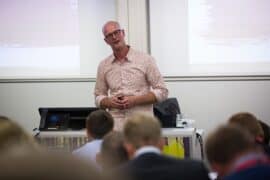The Lavin Agency Speakers Bureau
A speakers bureau that represents the best original thinkers,
writers, and doers for speaking engagements.
A speakers bureau that represents the best original thinkers,
writers, and doers for speaking engagements.
Your “primal world beliefs”—what kind of world you think you live in—can powerfully influence your wellbeing, your work, and much more. But you can choose what to believe.
We all share the same world, but do we all see it the same way? Dr. Jer Clifton says that our “primal world beliefs”—how we perceive the world as a whole—may dramatically affect our wellbeing, our relationships, our work, and virtually every other realm of our lives. For example, if we perceive the world as being a dangerous place, we are less able to trust and work with others. But when we perceive it as a safe place instead, our mental health can skyrocket. Widely considered the world’s leading expert on this vital and emerging field, Jer has identified 26 primals that shape us in powerful ways. And because these views actually have little to do with the circumstances we face, we’re free to choose what we want to believe. In talks, Jer reveals how understanding how we really see the world can help us understand others better, communicate better, and boost our own success and wellbeing.
If all your problems went away right now, would you be happy? Probably at first, says Dr. Jeremy “Jer” Clifton. But it turns out that in the long term, happiness has much more to do with how we perceive the world than what the world is actually like. Jer is the Director of the Primals Project at the University of Pennsylvania and Senior Research Scientist at the Penn Positive Psychology Center. He’s been featured on Hidden Brain, where he unpacked the deep implications of primals for everyday life, and has scientifically validated a survey with his team so you can identify your own primal world beliefs and find out how you compare to the national average.
His pioneering research into primals—alongside some of the world’s top psychologists like Dr. Martin Seligman and Dr. Angela Duckworth—has made him the leading expert in this field. He’s shown that how we see the world is powerfully connected to everything from how happy we are to how successful we are at work. And these beliefs aren’t fixed, he says. Initial evidence suggests that we’re free to choose the ones we want to hold, and how we want to relate to others and the world around us.
With his team of primals researchers, Jer examined 1,700 quotes from 358 of the most influential texts in global human history, conducted focus groups with people from the four major world religions, analyzed 80,000 tweets about the world from a database of over 2 billion tweets, and much more. He found 26 primal beliefs that influence how you see the world—like whether you think it’s worth exploring, abundant, stable, or otherwise. Put together, these beliefs fall under three main beliefs: whether you think the world is safe (vs. dangerous), enticing (vs. dull), and alive (vs. mechanistic). These beliefs are deeply tied to your wellbeing. For example, if you believe the world is dangerous, you’re more likely to have trouble trusting people, see neutral faces as criminals, and suffer from depression—regardless of how much danger you’re actually facing!
Primals act as a lens that shape our interpretation of “theoretically every situation we are ever in,” Jer says. Although this field is still emerging, the implications are already enormous. If we can understand ourselves better, we can make better decisions, build better teams, and find new pathways to success in every realm of our lives. We can even learn how to get our message across to others who view the world differently—a crucial skill in every field from leadership to marketing. Primals research unlocks new insight into why humans behave the way we do, Jer says. “For millennia, people have thought that understanding others requires seeing the world as they do. Primals research provides the tools to do that better than before.”
Jer received his PhD in psychology from the University of Pennsylvania under pioneering psychologists Dr. Martin Seligman and Dr. Angela Duckworth. His publications include a 2019 Psychological Assessment article that empirically mapped primal world beliefs and was featured in the Washington Post; a 2020 Psychological Methods article on validity versus reliability tradeoffs in scale creation; and a 2022 Perspectives on Psychological Science article on cross-cultural scale invariance. His research has also been featured in Forbes, The Atlantic, Psychology Today, Scientific American, Hidden Brain, and many more.

Associate Professor of Business Economics and Public Policy at Wharton 2024 "Top 40 Under 40" Business Professor Author, Femonomics (Forthcoming)
Prof. of Social Psychology & Organizational Behavior at Stanford Director of the Polarization and Social Change Lab
Performance psychologist Head of the MLB Players Association Mental Health Division Former Director of Mental Conditioning for the New York Giants Author of Life as Sport

Author, A Brief History of Intelligence AI Entrepreneur and Founder of Bluecore Forbes 30 Under 30 Honoree

Professor of Organizational Behavior at London Business School Author of Alive at Work

Author of Jerks at Work and Job Therapy NYU Professor of Psychology

Author of Grit, the #1 New York Times Bestseller | Pioneering Researcher on Grit, Perseverance, and the Science of Success

2024 Nobel Prize Winner | 3rd Most Cited Economist in the World | MIT Institute Professor | Bestselling Co-Author of Why Nations Fail and Power and Progress

Pulitzer Prize-Winning Creator of The 1619 Project | Executive Producer of the Emmy Award-Winning 1619 Project Hulu Docuseries | MacArthur Genius
Nike's Former Chief Marketing Officer | Author of Emotion by Design
CEO of The Atlantic | Former Editor-in-Chief of WIRED

Is this an enticing world, or a dull one? Is the world cooperative, or competitive? Jer Clifton says that your answers to these questions may powerfully shape many things about your life, from whether you’re able to trust others to how satisfied you are with your career. As Director of the Penn Primals Project and the leading expert in this field, Jer has identified 26 “primal world beliefs” that could influence your work, wellbeing, and more.
In this fascinating talk, Jer takes you through his research on this emerging field. He explains the three major primals (safe vs. dangerous, enticing vs. dull, and alive vs. mechanistic), and discusses surprising examples to show how these views affect your life in practical ways: for instance, how people who view the world as dangerous are more likely to over-estimate the prevalence of bear attacks, to accidentally shoot people in shooting simulations, and to develop depression. He demonstrates how holding positive beliefs can actually make you a happier person, help you connect better with others, and equip you to be more curious and effective at work.
“My job is not to say which belief is true,” Jer says, “but I can give you some insight into how your answer might affect your life.” You’ll walk away from this talk with a better understanding of yourself, realizing that people aren’t quite so different from you as they seem—but they do see the world differently.